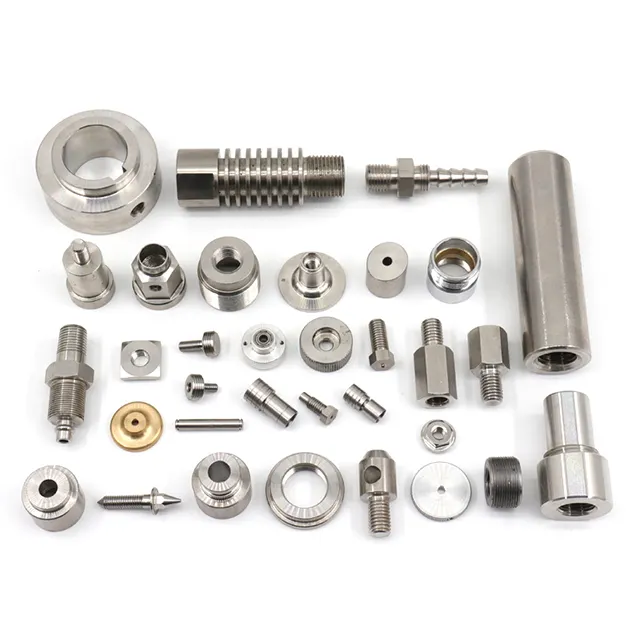In the intricate landscape of mechanical engineering and manufacturing, custom parts play a pivotal role. From the precision of custom fasteners to the versatility of fiberglassing, understanding the nuances of each manufacturing method is paramount. This comprehensive guide sheds light on the primary manufacturing techniques, applications, advantages, and disadvantages of a range of custom mechanical parts, including plastic enclosures, metal spinning, flywheels, and more. Whether you’re an engineer, manufacturer, or enthusiast, this guide offers valuable insights to help you navigate the world of custom mechanical parts manufacturing.
Custom Fasteners
| Manufacturing Method | Application | Advantages | Disadvantages |
|---|---|---|---|
| CNC Machining | Joining components in various applications | High precision; Suitable for complex designs | Higher cost for small batches |
| Cold/Hot Forging | Joining components in various applications | Enhanced strength; Efficient for bulk production | Design limitations |

Custom Bolts
| Manufacturing Method | Application | Advantages | Disadvantages |
|---|---|---|---|
| CNC Machining | Joining components in various applications | High precision; Suitable for complex designs | Higher cost for small batches |
| Cold/Hot Forging | Joining components in various applications | Enhanced strength; Efficient for bulk production | Design limitations |
Custom Screws
| Manufacturing Method | Application | Advantages | Disadvantages |
|---|---|---|---|
| CNC Machining | Joining components in various applications | Precision threading; Suitable for unique designs | Costly for small batches |
| Thread Rolling | Joining components in various applications | Efficient for bulk production; Consistent threading | Not ideal for non-standard threads |
Custom Knobs
| Manufacturing Method | Application | Advantages | Disadvantages |
|---|---|---|---|
| CNC Machining | Control or adjustment interfaces | Detailed designs; Material versatility | Higher cost for intricate designs |
| Injection Molding | Control or adjustment interfaces | Suitable for bulk production; Variety of materials | Initial mold setup cost |
Custom Heat Sink
| Manufacturing Method | Application | Advantages | Disadvantages |
|---|---|---|---|
| CNC Machining | Thermal management in electronics | Precision fins; Customizable designs | Higher cost for complex designs |
| Extrusion | Thermal management in electronics | Efficient for standard designs; Cost-effective | Limited to certain materials and shapes |
Custom Wrench
| Manufacturing Method | Application | Advantages | Disadvantages |
|---|---|---|---|
| CNC Machining | Turning bolts and nuts | Ergonomic designs; Precision fit | Higher cost for unique designs |
| Forging | Turning bolts and nuts | Enhanced durability; Suitable for standard designs | Limited intricacy |
Custom Wrenches
| Manufacturing Method | Application | Advantages | Disadvantages |
|---|---|---|---|
| CNC Machining | Turning bolts and nuts | Consistency in sets; Strong construction | Setup time for unique sets |
| Forging | Turning bolts and nuts | Enhanced durability; Suitable for standard designs | Limited intricacy |
Custom RC Parts
| Manufacturing Method | Application | Advantages | Disadvantages |
|---|---|---|---|
| CNC Machining | Components for remote-controlled devices | Precision for moving parts; Customizable designs | Higher cost for intricate parts |
| Injection Molding | Components for remote-controlled devices | Suitable for plastic components; Efficient for bulk production | Material limitations |
Custom Bushing
| Manufacturing Method | Application | Advantages | Disadvantages |
|---|---|---|---|
| CNC Machining | Reducing friction, limiting motion | Precision fit; Suitable for complex designs | Costly for small batches |
| Cold/Hot Forging | Reducing friction, limiting motion | Enhanced durability; Efficient for standard sizes | Limited to certain designs |
Custom Fiberglassing
| Manufacturing Method | Application | Advantages | Disadvantages |
|---|---|---|---|
| Molding, Hand Lay-Up, Pultrusion | Boat hulls, car panels, architectural structures | Versatile in applications; Durable | Labor-intensive; Requires skilled labor |
Custom Plastic Enclosures
| Manufacturing Method | Application | Advantages | Disadvantages |
|---|---|---|---|
| Injection Molding, Vacuum Forming | Electronics casings, protective covers | Efficient for bulk production; Variety of materials | Initial mold setup cost; Limited to plastic materials |
Custom Metal Spinning
| Manufacturing Method | Application | Advantages | Disadvantages |
|---|---|---|---|
| Metal Spinning on a Lathe | Bowls, lampshades, cookware | Efficient for symmetric parts; Cost-effective | Limited to axially symmetric parts |
Custom Flywheel
| Manufacturing Method | Application | Advantages | Disadvantages |
|---|---|---|---|
| CNC Machining, Forging | Engines, machinery for energy storage | Precise dimensions; Suitable for specific applications | Higher cost for complex designs |
Custom Plastic Tubes
| Manufacturing Method | Application | Advantages | Disadvantages |
|---|---|---|---|
| Extrusion, Injection Molding | Medical devices, packaging, fluid transport | Efficient for linear shapes; Variety of materials | Limited to tubular shapes |
Custom Plastic Cover
| Manufacturing Method | Application | Advantages | Disadvantages |
|---|---|---|---|
| Injection Molding, Vacuum Forming | Protective covers for devices, machinery | Efficient for bulk production; Variety of materials | Initial mold setup cost; Limited to plastic materials |
Custom Wire Forming
| Manufacturing Method | Application | Advantages | Disadvantages |
|---|---|---|---|
| CNC Wire Bending, Spring Coiling | Springs, clips, wire racks | Precision forming; Suitable for complex shapes | Setup time for unique designs |
In conclusion, the choice of manufacturing method largely depends on the specific requirements of the custom part in question. Factors such as design complexity, production volume, material preferences, and budget constraints all play a role in determining the most suitable method. By understanding the advantages and limitations of each method, manufacturers and engineers can make informed decisions that lead to high-quality, cost-effective outcomes.

